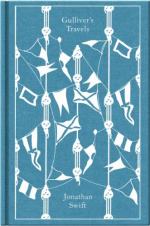Their style is clear, masculine, and smooth, but not florid; for they avoid nothing more than multiplying unnecessary words, or using various expressions. I have perused many of their books, especially those in history and morality. Among the rest, I was much diverted with a little old treatise, which always lay in Glumdalclitch’s bed-chamber, and belonged to her governess, a grave elderly gentlewoman, who dealt in writings of morality and devotion. The book treats of the weakness of human kind, and is in little esteem, except among the women and the vulgar. However, I was curious to see what an author of that country could say upon such a subject.
[Illustration]
This writer went through all the usual topics of European moralists, showing how diminutive, contemptible, and helpless an animal was man in his own nature; how unable to defend himself from inclemencies of the air, or the fury of wild beasts; how much he was excelled by one creature in strength, by another in speed, by a third in foresight, by a fourth in industry. He added, that nature was degenerated in these latter declining ages of the world, and could now produce only small births, in comparison to those in ancient times. He said, it was very reasonable to think, not only that the species of men were originally much larger, but also, that there must have been giants in former ages; which as it is asserted by history and tradition, so it hath been confirmed by huge bones and skulls, casually dug up in several parts of the kingdom, far exceeding the common dwindled race of man in our days. He argued, that the very laws of nature absolutely required we should have been made in the beginning of a size more large and robust, not so liable to destruction, from every little accident, of a tile falling from a house, or a stone cast from the hand of a boy, or being drowned in a little brook. From this way of reasoning the author drew several moral applications, useful in the conduct of life, but needless here to repeat. For my own part, I could not avoid reflecting, how universally this talent was spread, of drawing lectures in morality, or, indeed, rather matter of discontent and repining, from the quarrels we raise with nature. And I believe, upon a strict inquiry, those quarrels might be shown as ill-grounded among us as they are among that people.
As to their military affairs, they boast that the king’s army consists of a hundred and seventy-six thousand foot, and thirty-two thousand horse: if that may be called an army which is made up of tradesmen in the several cities, and farmers in the country, whose commanders are only the nobility and gentry, without pay or reward. They are indeed perfect enough in their exercises, and under very good discipline, wherein I saw no great merit; for how should it be otherwise, where every farmer is under the command of his own landlord, and every citizen under that of the principal men in his own city, chosen after the manner of Venice, by ballot?




